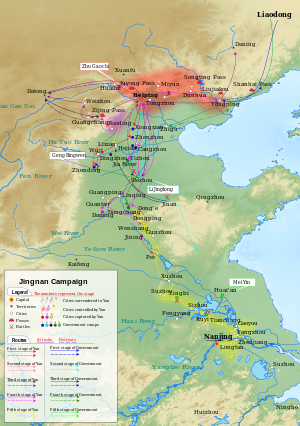
Back Kampaň ťing-nan Czech Ĝjingnana Kampanjo Esperanto Campaña Jingnan Spanish Campagne Jingnan French Kampanye Jingnan ID Campagna Jingnan Italian 靖難の変 Japanese 정난의 변 Korean Jingnanfelttoget NB Война ради преодоления трудностей Russian
| Jingnan campaign | |||||||
|---|---|---|---|---|---|---|---|
 Map showing the Jingnan campaign | |||||||
| |||||||
| Belligerents | |||||||
|
Princedom of Yan Princedom of Ning | Ming central government | ||||||
| Commanders and leaders | |||||||
|
Zhu Di, Prince of Yan Zhu Gaochi, Hereditary Prince of Yan Zhu Gaoxu, Prince of Gaoyang Comm. Zhu Gaosui Yao Guangxiao Qiu Fu Zhu Neng Zhang Yu † Zhang Fu Zheng He Zhu Quan, Prince of Ning Three Guards of Doyan |
Zhu Yunwen, the Jianwen Emperor (MIA) Geng Bingwen Tie Xuan Li Jinglong Xu Huizu Qi Tai Huang Zicheng Fang Xiaoru Sheng Yong | ||||||
| Chinese name | |||||||
| Traditional Chinese | 靖難之役 | ||||||
| Simplified Chinese | 靖难之役 | ||||||
| |||||||
| Jingnan rebellion | |||||||
| Traditional Chinese | 靖難之變 | ||||||
| Simplified Chinese | 靖难之变 | ||||||
| |||||||
The Jingnan campaign, or the campaign to clear away disorders, was a propagandistic term used by the victorious side to refer to the civil war that took place between 1399 and 1402 in the Ming dynasty. This conflict was between the Ming government, led by the second Ming emperor, the Jianwen Emperor, and his uncle, Zhu Di, Prince of Yan. The war was sparked by the removal of the emperor's uncles and the restriction of Zhu Di's power by the central government after the Jianwen Emperor ascended to the throne in 1398. In 1399, Zhu Di rebelled under the guise of restoring order and the rights of the princes. After three years of fighting, he successfully conquered the capital of Nanjing in June 1402, while the emperor and his family were likely killed in the palace fire. This marked the end of the war.
Soon after, Zhu Di ascended to the throne as the third emperor of the Ming dynasty. Upon assuming power, he made efforts to erase the legacy of the Jianwen Emperor by removing his supporters from positions of authority and reversing his reforms. Despite initially rebelling in the name of protecting the rights of the princes, Zhu Di adopted a similar oppressive stance towards them as the Jianwen Emperor and gradually stripped them of their political influence.